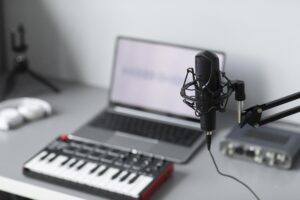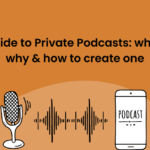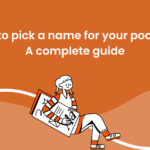In podcasting, respecting intellectual property rights and creating original content is the key to success. Copyright and licensing are crucial tools in maintaining this balance, and it is important for creators to have a solid understanding of these concepts.
Music, in particular, can greatly enhance the quality of a podcast, but it is important to understand music copyright laws and how to legally incorporate music into your podcast without infringing on the rights of others. Ensuring that your content is legally compliant can prevent potential legal issues down the line.
This blog post aims to provide a comprehensive overview of these topics, empowering podcasters to navigate the legal landscape and create original and legally compliant content.
What is copyrighted and licensed music?

Copyright is an essential legal right that gives exclusive control to the creator of any original work, including music. This right ensures that the creator has complete ownership of their artwork and is protected against unauthorized use.
Any unauthorized usage of copyrighted music constitutes infringement, and the copyright holder may take legal action against the infringer. Although some exceptions exist, including fair use and public domain, which permit the use of copyrighted music without permission.
Licensed music refers to music that has been legally obtained for use in podcasts. Obtaining a license means you have obtained the necessary permission from the copyright holder to use their copyrighted music in your podcast. Licenses can be purchased directly from the copyright holder, from music publishers, or through music licensing platforms.
Why is it required?
By obtaining licenses, podcasters respect the rights of copyright holders, contribute to the sustainability of the music industry, and provide an enhanced listening experience for their audience.
Copyright and licensing of music are required in podcasts for several important reasons:
Legal Compliance
Using copyrighted music without permission or proper licensing can have significant consequences for podcasters. As such, using copyrighted music without permission or licensing can lead to legal consequences such as copyright infringement claims, lawsuits, and financial penalties By obtaining the necessary licenses, podcasters ensure they are operating within the boundaries of the law and respecting the rights of copyright holders.
Protection of Intellectual Property
Copyright acknowledges the creative efforts of musicians, songwriters, and other creators by granting them exclusive rights to control the use and distribution of their works. Consequently, by necessitating licenses for music usage in podcasts, copyright law effectively safeguards the rights and interests of these creators. Moreover, it ensures that they receive the rightful compensation and recognition they deserve for their valuable contributions.
Fair Compensation for Artists
Licensing music for use in podcasts enables artists, composers, and other music industry professionals to receive just compensation for their works. Furthermore, when podcasters obtain licenses, they typically pay royalties or fees to the copyright holders. As a result, these royalties contribute to the livelihood of musicians and support the continued creation of music.
Avoidance of Legal Disputes
Obtaining licenses provides a clear agreement and documentation thereby ensuring that the copyright holders have explicitly granted permission for the use of their music. Consequently, this minimizes the risk of receiving takedown notices, cease and desist orders, or legal claims from copyright holders who may object to the unauthorized use of their works.
Ways to avoid copyright claims on your podcast
Podcasters can take certain steps to minimize the risk of receiving copyright claims related to the music used in their podcasts. While these measures cannot guarantee complete avoidance of copyright claims, they can help mitigate the likelihood of such claims and contribute to a more legally compliant podcasting experience.

Here are some strategies podcasters can employ:
Use Royalty-Free Music
Royalty-free music is pre-licensed so podcasters can use it without additional royalties. These licenses offer different permissions and restrictions, so it’s important to know the specific requirements of each license.
Platforms such as Pixabay (https://pixabay.com/music/) and Free Music Archive (https://freemusicarchive.org/home) offer extensive libraries of royalty-free and Creative Commons-licensed music. There are various options available for you in Hubhopper App Audio Library as well to use royalty-free music in your podcasts.
Seek Permission from Independent Artists
Contacting independent artists directly to seek permission for using their music in your podcast can be a mutually beneficial approach. Many emerging artists are open to collaborations and exposure, especially if properly credited and linked in the podcast description. Clear communication and documentation of permission received from the artists are essential to avoid potential disputes in the future.
Understand Fair Use
Fair use allows limited use of copyrighted material for purposes such as criticism, commentary, news reporting, research, teaching, or parody. However, determining fair use can be subjective and depends on various factors. If you believe your use of copyrighted music falls within the fair use doctrine, it is advisable to consult with legal professionals to assess the specific circumstances.
Obtain Licenses
Research music licensing agencies, publishers, or platforms that provide easy access to licenses for the desired music. Properly licensed music ensures that you have obtained permission from the copyright holder to use their music in your podcast.
Monitor and Respond to Copyright Claims
Regularly monitor your podcast episodes and respond promptly to any copyright claims you receive. Platforms like YouTube and SoundCloud have mechanisms to identify copyrighted content automatically. If you receive a copyright claim, then you must take appropriate actions such as:
– removing or replacing the infringing music
– disputing the claim if you believe it is invalid
– seeking legal advice to address the situation.
Licensing Options for your podcast
It can be challenging to discern how to legally use copyrighted content in one’s artistic projects. For those looking to use copyrighted music in a podcast, there are several licensing options available.

The most common licenses are:
Public Performance License
This license grants permission to publicly perform copyrighted music, which includes playing music in a podcast episode. Performance rights organizations (PROs) like ASCAP, BMI, and SESAC administer these licenses.
Mechanical License
If you plan to use a copyrighted song in your own project or recording, then you will need a mechanical license. These are legal permissions that authorize the use of copyrighted music for certain purposes, such as adding it to a film, or cover recording. These licenses are usually acquired through music publishers or mechanical rights agencies.
Sync License
Podcast visuals can create a more immersive and engaging experience for your listeners. However, it’s important to note that if you wish to do so, you’ll need to obtain a sync license. You can get these licenses directly from copyright holders or through music licensing platforms.
Regardless of the option chosen, it’s important to note that using copyrighted music without permission can lead to significant legal consequences. So it’s always best to take the time to properly license the music being used in one’s podcast.
What happens if Hubhopper detects copyright infringement in an episode?
If your podcast episode contains copyrighted material then Hubhopper can take detect copyrighted content within an hour. If found, Hubhopper automatically disables the episode. However, this doesn’t mean that we delete the episode, which allows creators to address the issue before making any necessary changes.
The creator will receive an email with all the necessary details if copyright infringement is detected in an episode. Including the steps to fix the problem. In this scenario, the creator can take any of the below mentioned two steps:
1) Going onto the studio dashboard and re-uploading content without copyrighted content.
2) Appealing the decision by mailing our support (support@hubhopper.com) and after going over the specific case, we start reverting the erroneously flagged content back to a live episode.
Conclusion
Understanding copyright music in podcasting is crucial for podcast creators to avoid legal consequences. In addition, podcasters can create engaging content while respecting the rights of copyright holders. Fortunately, there are several ways to ensure that your podcast is compliant with copyright guidelines while still incorporating music into your episodes. First and foremost, obtaining the necessary licenses for music is crucial.
Additionally, exploring royalty-free music is a great option for those who want to avoid licensing fees altogether. Understanding fair use and transformative use is also important, as it allows creators to use copyrighted material in specific circumstances without infringing on the owner’s rights.
Staying informed and compliant is not only essential to avoiding legal issues, but also allows you to focus on producing high-quality podcast content that captivates your audience.




